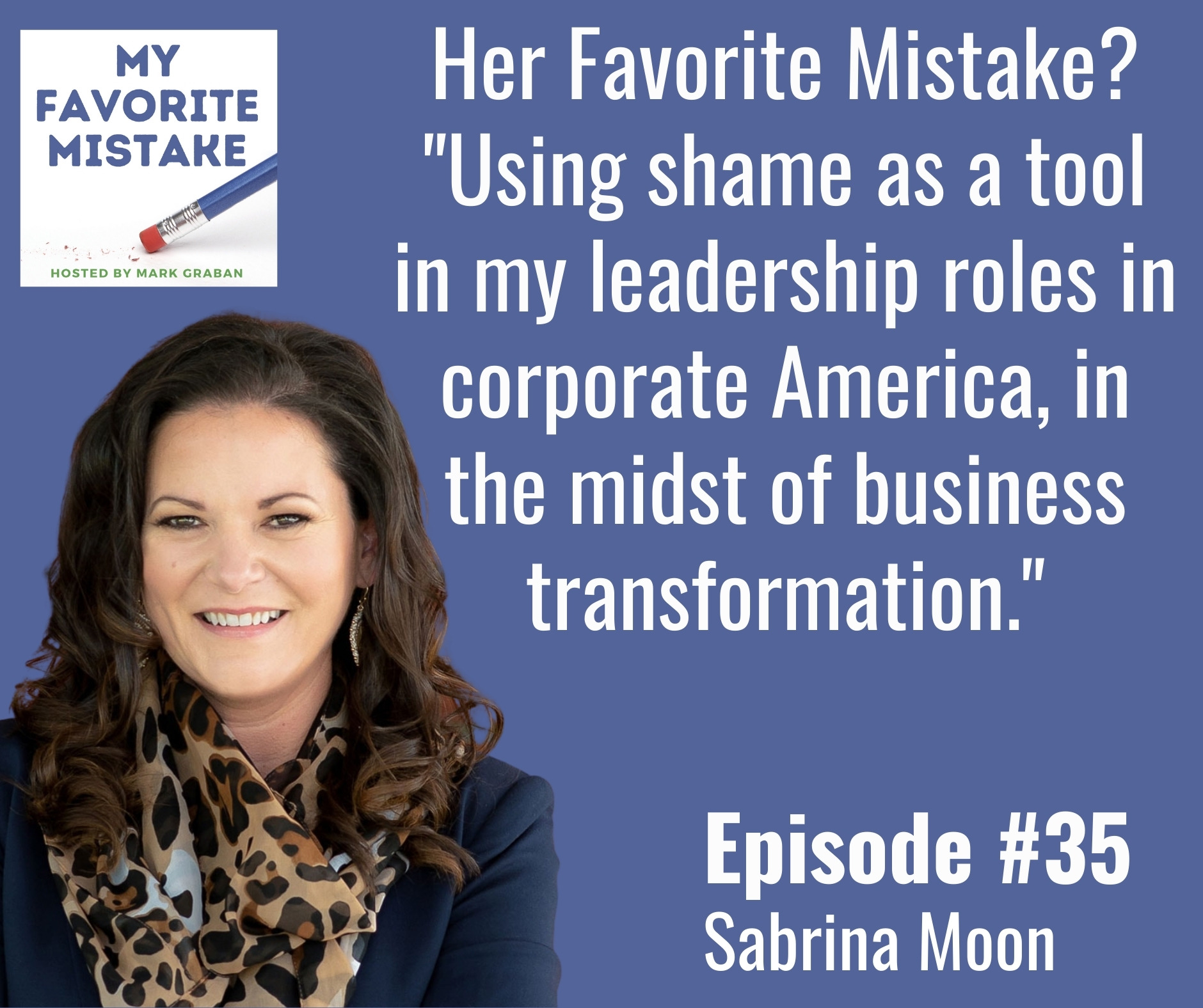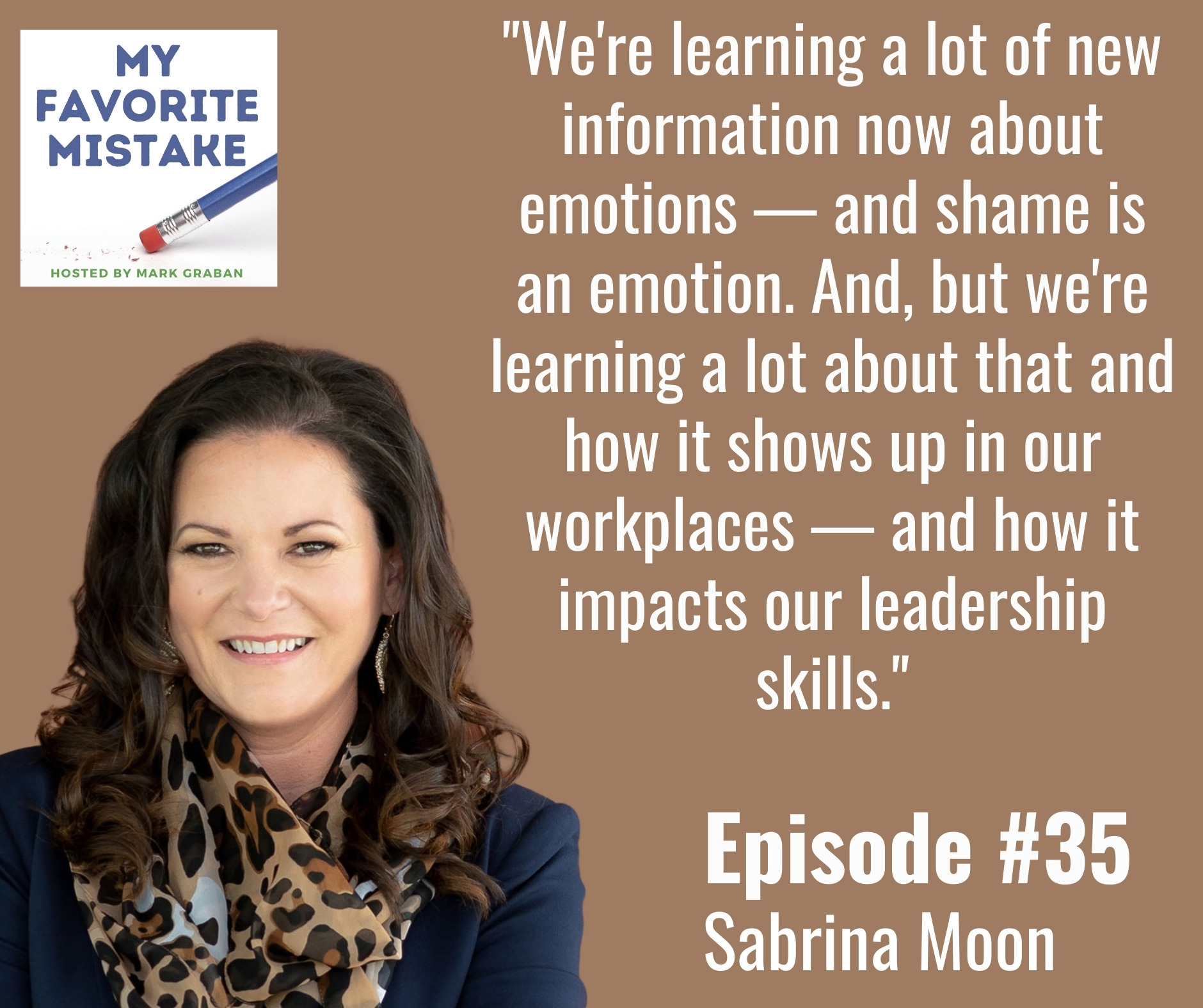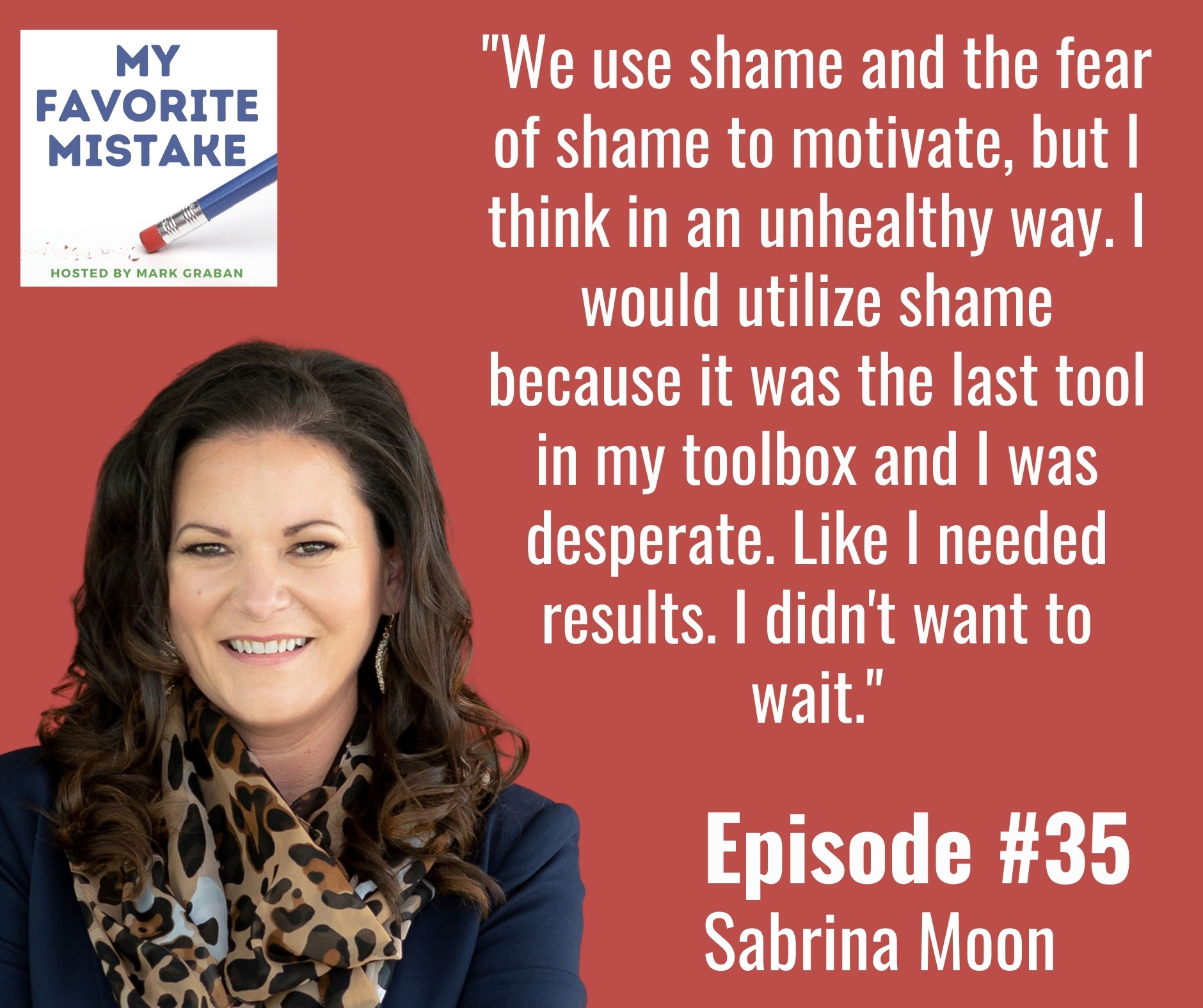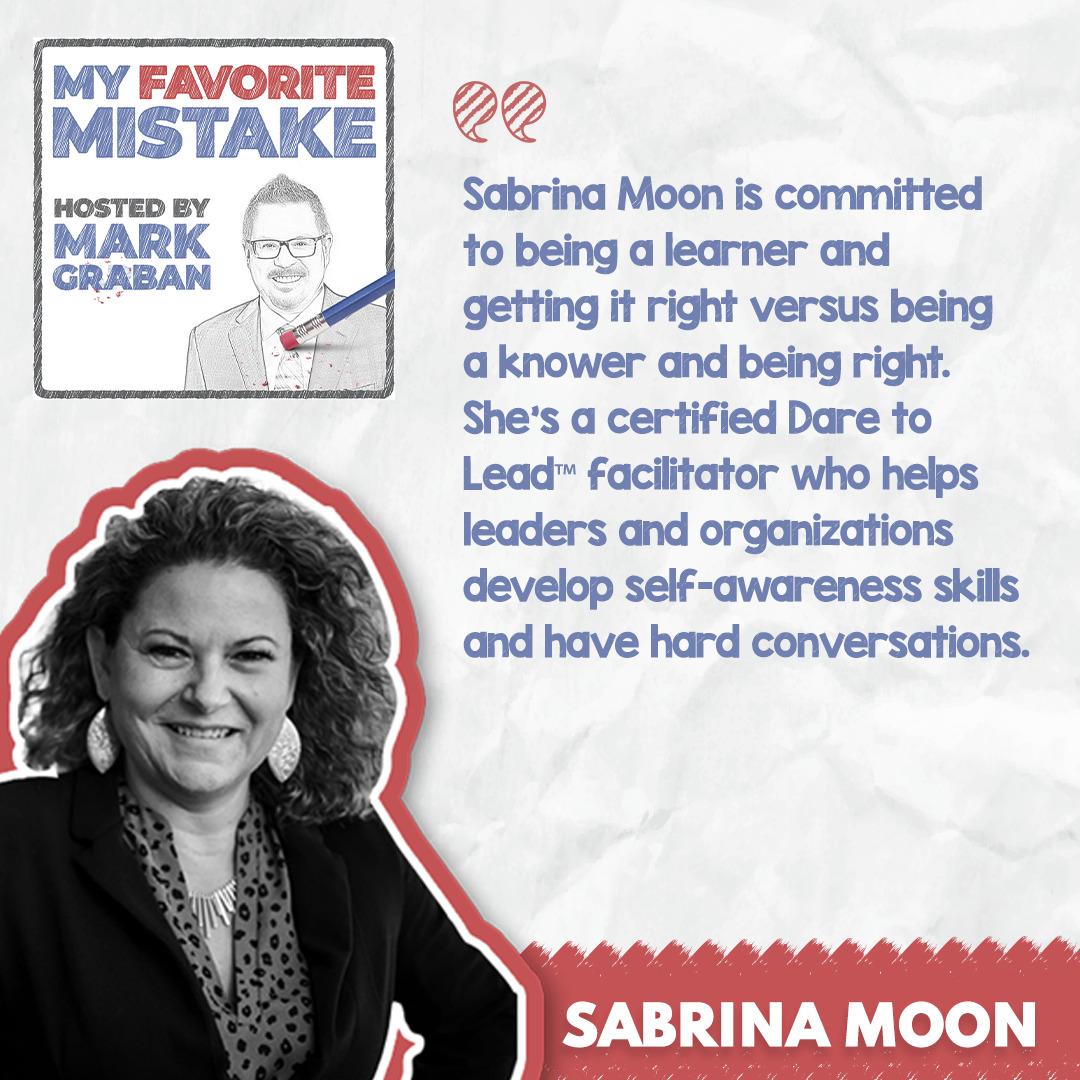Listen:
Check out all episodes on the My Favorite Mistake main page.
Joining me for Episode #35 is Sabrina Moon, the founder and CEO of the Problem Solving Institute. She's an engineer and a certified Dare to Lead™ facilitator.
Today, we talk about her favorite mistake of using shame as a leadership tool, and we discuss what we were exposed to in our early days at General Motors — the “command and control” leadership style (as Jamie V. Parker brought up in Episode #8). How did Sabrina learn to become more self-aware about her leadership style and the impact it had? What was the transformation process that she went through? Sabrina also shares what she has learned from Brené Brown about leading.
Watch the Full Episode:
Quotes:



Subscribe, Follow, Support, Rate, and Review!
Please follow, rate, and review via Apple Podcasts or Podchaser or your favorite app — that helps others find this content and you'll be sure to get future episodes as they are released weekly. You can also become a financial supporter of the show through Anchor.fm.
You can now sign up to get new episodes via email, to make sure you don't miss an episode.
This podcast is part of the Lean Communicators network.

Other Ways to Subscribe or Follow — Apps & Email
Using Shame As A Leadership Tool With Sabrina Moon

We're joined by Sabrina Moon. She is the Founder and CEO of The Problem Solving Institute. Like me, she's an engineer. Unlike me, she's a certified Dare to Lead™ facilitator. That's based on the work of Brené Brown.
Yes, it is. Glad to be here.
Thank you for being here. I am looking forward to your story and the conversation that we're going to have afterward, Sabrina. We'll jump right in. What would you say is your favorite mistake?
When I thought about this question, the list was long, but the shortest answer is using shame as a tool in my leadership roles in Corporate America, in the midst of business transformation, and then some.
[bctt tweet=”Her favorite mistake? “Using shame as a tool in my leadership roles in corporate America, in the midst of business transformation.”” via=”no”]
Is there a particular story that comes to mind that helps illustrate a situation where something went wrong? How did you react as a leader where shame was part of it?
There are lots of stories and lots of instances, and I'm going to share that. Before we came into this space, I listened to Jamie Parker‘s interview with you, which was awesome. I need to take her for virtual coffee. She's my people. Listening to her talk about a recovering command and control leader, immediately I was like, “Yes, aren't we all in some ways?” especially if we have been leading in lean spaces or manufacturing spaces. When I think about command and control, that's how I was taught to lead. When I think about that, I was taught by leaders and mentors who were passing on the baton to me and doing the best that they could.
This story in particular will be hard, but the only way that we can understand what I mean by using shame is to go there. Oftentimes when I think about command and control, it was, for me, usually an intolerance for connecting with people and an intolerance for vulnerability in general. The way that I would show up in the places that I was leading was like a hammer. In fact, I earned that nickname, Hammer.
When you say you were taught that, that resonates with me because if I wasn't careful, that's what I was going to be taught. I rebelled against that from the beginning. There's no shame in following what examples are being set for you in an organization.
That's the thing. What we're being taught as leaders, that was leadership at the time. We're learning a lot of new information now about emotions, and shame is an emotion. We're learning a lot about that now, how it shows up in our workplaces, and how it impacts our leadership skills. We're also learning self-awareness skills. They are lacking in our leadership and our organizations. We just don't know what we don't know.
[bctt tweet=”We’re learning a lot of new information now about emotions – and shame is an emotion. We’re learning a lot about that and how it shows up in our workplaces – and how it impacts our leadership skills.” via=”no”]
Reflecting back a little bit on Jamie's story, what I appreciated in her story was the self-awareness piece. She talks about how a mentor had said to her, “How's that working for you?” She was like, “I have to reflect back on how this is working for me.” I applaud that skill and being able to be curious. When I think about my missteps in using shame, specifically, I think about a business transformation that I was leading in a small community, and it was to save this organization from bankruptcy.
I remember working sixteen hours a day. I remember when I first walked into this plant, there were no stripes on the aisleway to know where you could walk or not be. When you walked in, you didn't know if you were going to get nailed by a fork truck or not. In the midst of that transformation, there was a lot of stress, a lot of pressure, and a lot of fear about people losing their jobs. There were about three of us who had the skills, some that we learned from General Motors but some elsewhere, to be able to transform this plant.
I would stand frequently out of the final line. I used my cell phone at the time to capture cycle time. We just could not get the rate we needed. We couldn't get finished goods out the door in the time that we needed. I would use shame and the fear of shame to keep those people in line. What I mean by that is I would say things like, “What is wrong with you? You suck. You're an idiot,” or things like, “Suck it up. Here's what you need to be producing at the end of the line, and you're not. This has to be your fault,” because every time I take some times on the line, this has nothing to do with the equipment, it has everything to do with you.
When I reflect back on those statements, those are not proud moments. Those are moments of me using shame in a way that was motivating that team temporarily. It was also corroding trust and creating an environment where people felt the need to come out swinging toward me. In that specific example, I didn't know what I didn't know. I thought that that was leadership because I was taught to use that type of language.
That's why you might feel bad about it, but I won't shame you individually for having modeled what was being taught to you explicitly and through example in that environment.
Even when we reflect back on your career, and if we were to think of those moments when shame was being used in the industries that you were leading, it was standardized and normal. It was a reflection of the leadership at the time. Now that when we think about that story, it took me some time to look back and do my own type of self-continuous improvement and my own leadership transformation. I had no idea the reason I was behaving in that way. I thought it was because of how I was taught, but honestly, I didn't understand that I was in shame, hence the reason I was using shame. Let me unpack that a little bit.
When we say the word shame, it is considered the primitive master emotion that we all experience, but none of us want to talk about it. When we think about Brené Brown and her research, she's been the go-to person regarding emotions and emotional literacy for leaders. She helps us understand vulnerability and shame. Shame is that emotion essentially that we feel when we feel something about us is inherently flawed, broken, or unworthy of belonging. It shows up in our workplace as something fierce because people are there. When we think about that emotion and what it means for us, we have to understand how we behave when we're in that emotion. This is where self-awareness skills come in.

When I think about shame, there are three patterned ways that we behave when we're hooked by something like shame or any tough emotion. We either use shame against people so we become defensive and we come out emotionally swinging, or we go into people-pleasing behavior. When we're in shame, we seek to make sure everybody's taken care of. Lastly, we withdraw and hide out from people when we're in shame. We disappear.
When I said I was using shame against this team, it was because I was in shame. That was true. That was a point in my life where I was struggling with the amount of hours I was working and struggling to take care of a sick mom with cancer. When I would come into work, I would come in so ticked off because we still hadn't made any progress. We were still losing money. People's jobs were still going to disappear, and I didn't know how to do that differently.
I would frequently come into that plant frustrated because we hadn't made any progress and the changes we had committed to implementing the day before weren't implemented. I was deeply feeling shame and I would offload my shame and my crap onto other people. It became easy for me to tell people that they were idiots and that no matter what they did, it wasn't going to be enough. It was using shame to fight shame was my common go-to in the workplace.
That reminds me of back when I was at General Motors. I worked there right out of college. It was from ‘95 to ‘97, very traditional, command and control leadership. There are a couple of them that would bully. The number two leader at our plant was notorious every single day. We would do this production review meeting between the first shift and the second shift. We have these internal consultants that have been hired from Toyota suppliers and one was from Nissan. They said, “You need to track your hourly production and we'll do this daily review.” You and I would now realize that the intent of a meeting like that is to give visibility to where the issues are, to direct resources, and to do problem-solving in a constructive way.
That data told this guy, Bob, who he needed to yell and scream at the most, which was not the intent of what any of this data or this review was supposed to be. We would have these old side wagering pools for a dollar of like, “Which word is Bob going to say first?” This is shaming language. He was bullying and there would be cursing. It would be calling people out in front of others, but the wager would always be, “Which word is Bob going to use first? Urgency or intensity?” Those were the two things in Bob's mind that was lacking. Clearly, that department or the plan as a whole was struggling only because people didn't care enough, or they didn't try hard enough. That was just ridiculous.
It is ridiculous. You've talked to a lot of leaders and seen a lot of things. When we think back about our careers, do we honestly think that people got up that morning saying, “I'm going to completely screw everything up that I can today. I want to make sure that I let Mark and Sabrina down as much as I can because I suck.” People are not wired like that. The lacking self-awareness that we bump into sometimes, somewhat a lot of our yucky ineffective leadership is happening outside of our self-awareness. It is up to us to dig in and get curious. That's the hard part. That's the part that requires vulnerability to look within and to be able to say, “What do I own in this so that I can understand how I show up differently?” With that said, I remember getting to that point of having to ask for feedback about how I was showing up, and that was tough.

Who were you asking for feedback? Your employees?
Yes, it eventually got to the point, but I was asking a leader that I respected like, “I feel like I keep bumping into this thing that I don't know what it is, and I want to do this differently. I'm not sure how.” I remember his feedback at the time was, “Sabrina, you come at people assuming that they are doing their worst, assuming that they are trying to intentionally screw some things up.” It was like, “I don't want to come at people at all. That's not who I am. How do I do this differently?”
That started the five-year transformation process of unpacking shame, how it showed up for me, how I could learn to do things differently, and how I could approach anyone regardless if it was a business transformation from a place of, “I believe they're doing the best that they can,” and hold them accountable at the same time. That's where understanding shame and shame resilience skills saved my professional career. Do I still screw things up? Yes.
If something's become a habit, that can be hard to break.
For sure, because we have seen results when we use shame.
At least in the short term. I was going to ask earlier. When you said, “It was motivating,” was it really motivating? If it was, is it just not sustainable?
We use shame and the fear of shame to motivate but in an unhealthy way. For me, I would utilize shame because it was the last tool in my toolbox, and I was desperate. I needed results. I didn't want to wait. I knew if I would talk to people using shaming language, they would physically move and get things done. In my mind, I made the decision that it was motivating. At what cost? When I started seeing that team members did not trust me, there was a lot of what we call back channeling happening as a result, which was talking about each other and not to each other. We couldn't do any effective problem-solving because there wasn't any trust. You then started seeing apathy set in, exhaustion, and all the other things that come as a result. Somebody has to go first to change that, and it's not them.
[bctt tweet=”We use shame and the fear of shame to motivate, but I think in an unhealthy way. I would utilize shame because it was the last tool in my toolbox and I was desperate. I needed results. I didn’t want to wait.” via=”no”]
You mentioned earlier saying a lot of times or too often leaders are not self-aware. I was going to ask you. What was the moment when you realized something clicked and like, “This is not effective?” I think you already alluded to it, was it that feedback? If so, elaborate on that. There's the risk that that moment didn't happen. How would your career have progressed differently without that?
When I think about the what-ifs, I was promoted often and quickly in the roles that I was in. There's a chance I could have been promoted more. I can guarantee that I would have not been promoted from within. I wouldn't have felt good about me because there was often that feeling of something isn't right, and I feel like I'm the common denominator.
I was feeling worse and worse as I was earning more and more and getting bigger titles and responsibilities. Had I not learned, the things would've been drastically different probably with some walking papers along the way. I'm grateful that I had that moment to help me understand what is within me that's not working well. Once I got the courage and the practice to step into those types of conversations and get more and more feedback, I started getting better at it, and then I started looking within.
What I hear you saying is that there was this discomfort and trying to unpack and figure out what was causing the discomfort, which led to the request for feedback. Correct me if I'm wrong, what I hear you saying is recognizing a gap between how I'm acting or who I'm being at work versus who I am or who I want to be. That built up and led to you asking for that feedback. It wasn't just a chance occurrence.
I felt there was a huge gap between who I was and how I was leading, and some of the messages and expectations around who I needed to be as a leader. I often struggled with how kind and how much I should care about the people I was leading. Should I care how well they're doing? Should I understand what's happening in their lives? Should I just drop the hammer on them?
There was a constant struggle between the two, and I was misfiring and misaligned on a regular basis that I would go home and I could just feel it. I would never stop talking about work, how frustrating it was, and how people wouldn't work with me in ways that I had hoped. It was a golden opportunity for self-discovery. There was a lot of gold in that failure.
It's good you took advantage of that opportunity for self-discovery. It sounds like when you were getting that feedback, you weren't in denial about it, but you realized that's happening and that can change.
I'm appreciative of the person who gave me feedback because they didn't come at me from a place of, “You suck. You're an idiot.” They didn't use shame on me. They were able to step into a place of compassion and empathy and say, “You might want to look at this. I'll support you along the way for you to look at it.” At that point, it started to unfold. I was able to dive deeper into my own self-awareness skills and how I was showing up and asking people often like, “How was that for you? Where can I improve?” It's the crux of what we do now.
It's interesting to look back and think about our own mistakes, growth, and development. I want to come back. You talked earlier about offloading the shame and quick story back at you. I'm thinking of Old Bob. It was this Chicago Saturday night live accent that he had like one of the super fans. I remember when I was getting ready to get out of there and go to grad school, I felt a little bit braver. Another engineer and I were in Bob's office, and he was putting on a show.
He intentionally turned around, dialed the phone on the credenza behind him, got it on speaker phone, and cursed, yelled, and screamed at one of the production area managers that I supported as an engineer. It was one-direction yelling. Poor Todd. Bob was laying to him. Bob got off the phone and I asked him some form of that help-me-understand questions like, “Help me understand what was going on there. How was that helpful?” I don't remember the exact words, but I challenged him like, “What's going on here?” He went on to explain what you described as offloading the shame. He said, “I yelled at Todd because my boss called and yelled at me, and his boss called and yelled at him.” He traced it up and blamed General Motors’ board of directors.
I kid you not. He was saying like, “That's the culture here.” Fair enough. I don't know how much tension he felt because I almost heard him saying, “This is what I'm expected to do,” which is different than just saying, “I love being a bleep hole.” I'd be curious if I could go back in time and ask him, “How comfortable does that behavior make you feel?” That might've been pushing it a bit too far. I would have gotten thrown out.
Back about that too, I think back about the moments, even when my boss or someone had approached me with shaming language because it happened a lot. I didn't have the resilience skills to be able to understand what I was up against because I was not paid to feel at work. I was not paid to talk about emotions. I was paid to get it done at all costs. I was paid to think and do not to feel. This was the hard lesson. I needed to learn how emotions were impacting my work, and so did my bosses, but it wasn't up to me to carry my bosses’ stuff or deal with their emotions.
It was up to me to take care of me and then lean into the hard conversation if and when it warranted itself, which I usually never did, not with senior leaders. If something was offloaded my way, it was my job to be the people-pleaser at all costs like, “How can I make sure you're okay,” and then I would drop the hammer and offload my shame under the teams I was leading. Even in class while railroading, that eight years of that work, was commonplace too. Again, it got resolved. The offloading, as I've learned, we blame and shame when we are feeling uncomfortable and we're feeling pain. When we don't have emotional language, then it's easy to cause pain for other people versus healing our own and dealing with it.

If I were to reverse time, I would love to be able to say to my bosses and my leaders, “What's happening for you right now? Are you all right? It doesn't seem like you're all right, and I'm not sure that this is going to be effective. What can I do right now as opposed to taking the lash-in? Do you just need a break?” I didn't have those skills then, but we have them now. We're getting better.
One other thing is we're talking about these manufacturing environments. This is more of human dynamics. Maybe this is what you learn through your study of Brené Brown's work, which I only have the most superficial knowledge of myself. In healthcare, this human behavior, it's so common the shaming tendency. People all throughout healthcare say, “Naming, blaming, and shaming.” That’s the norm. It's so dysfunctional and so harmful in so many ways. It ends up being harmful to patients. It harms the careers of people working in that environment. That's pre-COVID.
Has it gotten worse since COVID? Have you seen it getting even more?
I haven't traveled for work in eight months. I don't have quite the insights firsthand that I had when I was traveling. There's no shortage of news reports within industry news and even general news publications about how bad burnout is in healthcare. They've been overwhelmed and exhausted. You hear stories of people not being able to take a day off for how many weeks or months and pulling double shifts because colleagues are quarantined.
I can't imagine it's gotten better, but there are positive examples where the culture has been positive, to begin with. People are engaged and it's less of that top-down command and control style. I imagine the health systems that have had that more participatory culture are doing better, and I've heard reports of that, which is good.
I've been following your work for years. I'll never forget a conversation you and I had on LinkedIn at some point. It has given me a lot of respect for what you do and how you're leading. I'm going to paraphrase this. You may or may not remember it. We were talking about a lean transformation or something along those lines. I remember you making a statement publicly that people are complex, that it's not just so simple that we can apply a label on people. Your words were, “I'm a chatty introvert.”
You gave me some dichotomies about people, and it gave me a lot of respect for you because it helped me start practicing a behavior where I'm committed to being a learner and getting it right versus being a knower and being right. When we're under a lot of stress, including a pandemic, we're potentially on our worst behaviors. Sometimes we don't know about people. We have to be willing to extend them some grace and then recognize when we need our own breaks. You've been an example of that in our social media community.
Thank you. You use the word grace. That's something I've tried to be better at during the pandemic. Small example, Starbucks gets your drink wrong. It's not me to yell, curse, and scream, but it might be a matter of tone or look on my face where I let it be known that I'm upset. I try not to let stuff like that bother me because back to that point of like, “It's just a simple mistake. They can fix it. What's the big deal?” I'm trying to be more gracious about situations like that.
I do think we're all doing the best we can.
Sabrina, can you tell us a little bit more about the company that you founded, The Problem Solving Institute? We'll spend a couple of minutes talking about the type of work you do and how people can contact you. First off. How would you describe the institute and the work that you do?
I started my business with the intent of centering on process improvement and business transformation. It's a consulting business. The consulting work that I was primarily focused on was business efficiency and operational excellence. What I kept finding was that people were contacting me for leadership help. Help my team, my frontline workers aren't talking to each other. There's no trust. I kept being asked for that and then I recognized that that was part of my niche.
I also recognize that's the core of what problem solving is because we can't do any of the transformation work until we have some level of trust and willingness to communicate. The crux of what I do now is a lot of leadership development work, a lot of Dare to Lead work part of Brené Brown's work. I help leaders and organizations develop self-awareness skills and have hard conversations. I still do some transformation work in the background.

Self-awareness can be developed. That's a good thing to hear.
It's a teachable skill.
Imagine some of those difficult conversations might involve somebody being told they need to be more self-aware. How often is it someone coming to you saying, “I need help,” versus an organization saying, “These people need help?”
Occasionally, I will have a leader of an organization point the finger and be like, “It's my team,” but not a lot. Usually, leaders that reach out are often willing to discover things about themselves too. They want to be a part of the process. One of the big things I'm proud of now is doing work with law enforcement. I work heavily with law enforcement leaders. They're very similar to operations leaders. That's an episode for later, but there's a lot in common.
In terms of shaming or command and control. There is quite literally a rank command structure.
They're in that 24/7 environment where they're on, so a lot of hypervigilance, same with ops leaders. There are a lot of similarities between those environments and what they do in public service. There's an opportunity for growth for them too. It's great work.
That's very interesting. Our guest again is Sabrina Moon. I also want to mention and give a shout-out because I enjoyed the conversation you had with our mutual friend, Paul Critchley, on the New England Lean Podcast. I would encourage you if you want to hear a different conversation that touches on some of the same points. I heard that conversation and reached out to Sabrina and said, “Let's take a deeper dive into the my-favorite-mistake you had brought up in Paul's podcast.” Thank you for doing that, Sabrina. Thank you for being open to coming on here and exploring that.
Thanks for the invite and for your leadership, Mark. We appreciate you.
Thanks. Before we go, Sabrina, what's your website? How can people find you online?
The website is ProblemSI.com. I'm on LinkedIn heavily. Facebook is another place to reach out and connect.
Thank you so much to Sabrina Moon, Founder, and CEO of The Problem Solving Institute.
Thank you.
Important Links
- The Problem Solving Institute
- Dare to Lead™
- Brené Brown
- Jamie Parker – Past Episode
- New England Lean Podcast
- LinkedIn – Sabrina Moon
- Facebook – Sabrina Moon

